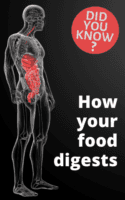What is the most important thing that helps the human body thrive? It’s food. From a young age we are told how important it is to finish our plate of food and eat our vegetables. That is because food plays a vital role in our immune system, but it can’t play that role alone, it needs the digestive system to make sure every element goes to where it’s needed the most in our bodies.
What is the digestive system?
According to Kids Health, food is fuel for the human body and its nutrients give our bodies’ cells the energy and substances they need to work. You may wonder how digestion is involved. Well, food needs to be digested into small pieces the body can absorb and use. So, there is so much more at work than just chewing and swallowing. Kids Health highlights that the first step in the digestive process happens before we even taste food. When you start smelling food, you start salivating, which is when the digestive process begins in preparation for the first bite.
How food digestion works
Lumen Learning states that there are six activities in the process of digestion:
Ingestion – is the entry of food into the alimentary canal through the mouth. The alimentary canal is the long tube of organs that include the oesophagus, stomach, and intestines.
Propulsion – the tongue and throat muscles push the food into the oesophagus. This is basically swallowing. Propulsion is the movement of food through the digestive area.
Mechanical or physical digestion – mechanical is the mainly physical process that does not change the chemical nature of the food. It just makes the food smaller to increase the ability of being able to swallow the food.
Chemical digestion – this is break down of complex food molecules into their chemical building blocks (for example, proteins into separate amino acids – which is what is left of the protein after the breakdown).
Absorption – determines food that will be nutrients for the body and food that is no value to the body. According to the BBC, digested food molecules are absorbed in the small intestine. This means that they pass through the wall of the small intestine and into our bloodstream.
Defecation – this is the final step in digestion, undigested materials are removed from the body as faeces. (It’s what we call number two when going to the bathroom).
What are easy foods to digest?
According to Healthline, foods that are easy to digest tend to be low in fibre. This is because fibre is the part of fruits, vegetables, and grains that isn’t digested by your body. As a result, the fibre passes through your large intestine and may cause a number of issues, from gas to bloating.
Canned or cooked fruits – cooking fruits lowers the amount of fibre in them.
Canned or cooked vegetables – like cooked fruits, once cooked they have lower fibre.
Meat products and protein – chicken, turkey, and fish digest well. Tender cuts of beef or pork and ground meats are other good options
Grains – these are the healthiest to eat in any diet. If you’re looking for easy-to-digest grains, look for white or refined breads or rolls, toast or trackers
Dairy products – dairy is low in fibre and may be easy to digest for many people. Try drinking plain milk or snacking on cheese, yogurt, and cottage cheese.
Cutting food into small pieces and chewing each bite well can be helpful to your digestion. Make some time for your meals so you aren’t eating in a hurry. Make sure you drink plenty of fluids throughout the day to avoid constipation as well.
What are foods you should avoid?
Healthline says that high-fibre foods fall on the other side of the spectrum. In addition to fibre, the way you cook your food, like frying, may upset your stomach. Carbonation and caffeine may cause issues as well.
Fruits, vegetables that are high in fibre and meat products that are fibrous could be difficult to digest.
Tips to help digestion after eating
No sleeping – sleeping immediately after eating doesn’t help digest your food properly. Rather eat at least two or three hours earlier before you sleep.
No smoking – smoking is toxic. When digesting, your body is already working with chemicals and smoking adds unnecessary toxicity.
No bathing – the blood around the stomach flows to other parts of the body during a shower instead of helping with digestion, which just delays digestion.
No fruits – according to the article different foods digest at different speeds. Eat fruits first as they are the easiest to digest. Fruits should be eaten an hour before a meal or two hours after a meal.
No tea – the article claims that tea leaves are acidic and will affect the digestion process. If you consume protein in the meal, the acid from the tea will harden the protein content, making it difficult to digest.
Taking care of yourself means taking care of the inside as well as the outside of your body. All these tips may sound farfetched but they matter in the long run of your health. So, take care of yourself and make sure the things you put inside your body are good for it.
***
Did you know that you are what you eat? Read more here.
Tell us: What surprised you the most about digestion and why?

